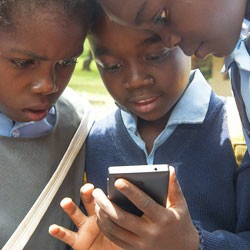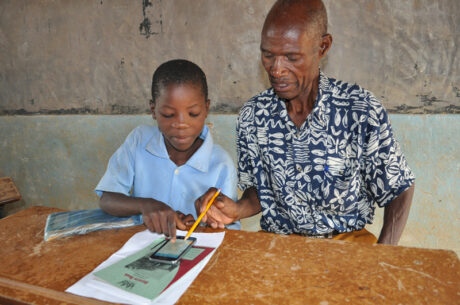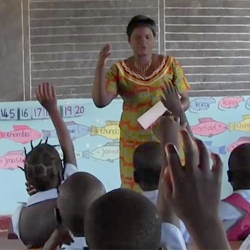Parents in rural Zambia are using their mobile phones in a novel way—to bring local folktales to the youngest members of the household.
The 18-month project called “The way we live,” or Makhalidwe Athu in the local language of Chinyanja, encourages young readers in a creative way. The innovativeproyecto de lectura móvil uses digital Short Message Service (SMS) and Interactive Voice Response (IVR) messaging platform to regularly share local language stories with the children and their families, conveniently on their personal mobile device.
A new study finds that Makhalidwe Athu is working.
During the first 12 meses, the pilot project found that caretakers – parents, grandparents and other extended family members – in all 1,200 participating households reported reading the mobile stories with their children at least once a week, y 78 percent said they read every SMS message when it was received three times a week.
The survey highlighted that Nuestros Valores is positively perceived by parents. All caregivers reported that the project helps their children’s learning process, and many household members are actively participating in the digital reading activity.
“Creative’s Makhalidwe Athu project provides a unique and interactive learning experience for students and their caregivers,” says Angela Musonda, program field coordinator for Creative Associates International’s innovative project. “Building on the successes and learnings of the initial pilot, the scaled-up project will encourage even more young readers with innovative tools to reach their full potential and create a future full of possibilities.”
The project also aims to illustrate story booklets that will be distributed to the targeted schools, reaching even more students with new reading materials. Nuestros Valores, que es implementado por Creative, es apoyado por el A NOSOTROS. Agencia para el Desarrollo Internacional, Visión Mundial y the Australian Government as part of Todos los niños leyendo: A Grand Challenge for Development project.
Connecting students with reading materials
In the Chipata and Lundazi districts of Zambia’s Eastern province, many primary schools lack a variety of reading materials. En 2014, the Ministry of General Education started teaching all subjects in local language in primary schools, an important step in ensuring young students develop mother-tongue literacy skills before transitioning to English.
But a limited supply of published local language books impedes new readers from advancing their reading skills.
En Zambia, less than 50 percent of children start primary school at the right age of 7 años, según Unicef.
Providing reading tools and resources helps empower children to achieve academic success. With the proper resources, an educated girl or boy can help break the cycle of poverty within their families and communities. Students who fall behind in the classroom struggle to grow their reading skills at home. A menudo, these students don’t return to the classroom.
Though literacy is low across Africa, rates of mobile phone usage are quite high.Across Africa, 93 percent of people have access to cell phone service.
Uniting communities through reading
Not only does Nuestros Valores help preserve culture and bring families together but community members are participating in the project as well. On a weekly basis, elstories are submitted by various community members and shared through the digital platform, reaching a wider audience and preserving the cultural folktales. The local communities have learned about the program through local media and community meetings.
Children and their caregivers gather together to read the crowdsourced, digital short stories on their mobile phones. As each story segment – a total of three – is received on the device, the student writes them down in corresponding Makhalidwe Athu exercise books.
For further comprehension, each story segment is followed by a question parents ask their children. The questions are asked through SMS, y una versión grabada de la historia está disponible para ayudar a los padres analfabetos.. Sixty-eight percent of participants who were surveyed in the pilot phase said they listen to the voice recording with their child. The students also practice their understanding by writing the stories in exercise books.
Más que 200 stories have been collected and shared during the project’s pilot phase and now the community can revisit the reading materials again and again for further practice and understanding. En el futuro, the stories can be repurposed for other education programs.



